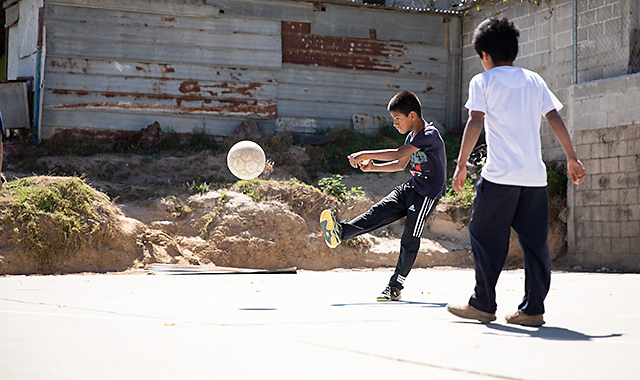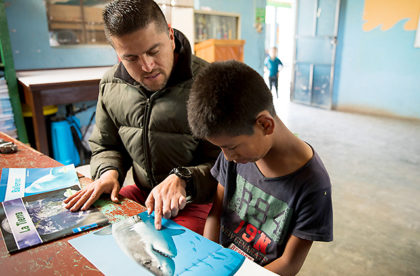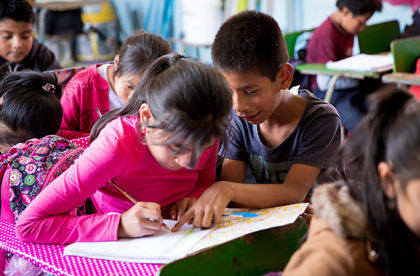
“German can’t kick!”
The children stood around professor Marco Venicio Sela Girón and stared. The jostling class, normally frenetic with movement, stood still. Nearly thirty elementary-age kids had gathered on the dusty playground at the Rafael Téllez García Elementary School in Sololá, Guatemala, to learn to play kickball and run in the sunshine. Even German.
“He won’t be able to.” Again, the kids called to Marco, as if the idea of their classmate playing kickball was a cruel joke. After all, German had trouble controlling his legs, failed to hear well and kept one of his arms tucked close to his body, as if it were a broken bird’s wing.
“Who said he can’t kick?” Marco asked, looking from the class to German. “Isn’t that right, German?”
German looked up so that the midday sun shone across his face. “Yes!”
The children pitched him the tattered soccer ball, and German kicked it out past where they stood waiting. His classmates hadn’t seen that coming. And then German ran.
“In that moment even German forgot that he had motor skill problems,” recalls Marco. “And he started to run the bases, and he was so happy and smiling and all his classmates were so surprised.”
For students with special needs, Guatemalan schools are difficult to navigate. There are no special services or helpers designated to meet whatever learning challenges these children present. Often these students are overlooked and ostracized as they fall behind their peers in academic achievement.
So, when Marco met German, a withdrawn fourth grader with significant physical challenges, the teacher took on the personal challenge of German’s education. Marco was convinced that German could do the academic work but that the student felt sidelined in class.
“You have to know how to motivate a child, and you have to tell them that they can do it,” says Marco. “There is nothing impossible.”
But having the time to personally attend to German during regular school hours was difficult for Marco, a teacher who every day manages a mixed-grade classroom brimming with more than thirty students. Child Aid Literacy Trainer Edgar Garcia, who mentors Marco, suggested German should attend Child Aid’s Adventures in Reading, a literacy program held during the months-long nationwide school break. Marco agreed and called German’s parents, who were happy and thankful for their son to get more personal attention.
“The first thing Marco did in the Adventures in Reading program was to motivate German and get him to commit to learning,” recalls Edgar.

Each day, the teacher read with German, asking him to describe what he observed in the book, and what he liked about the pictures. Little by little, the boy showed more interest in reading, and he began exploring new books each day, even picking books out to read to his teacher.
“He likes nonfiction books,” says Marco. “One of his favorite books is about a great white shark.”
Because of Marco’s personalized instruction and encouragement, German is now an active participant in the classroom.
“As time went on and I explained things to him and he saw my way of working with him, it all changed. He did a 180.” says Marco. “He is not shy anymore. He’s excited to learn new things.”
Marco says his training with Child Aid has been fundamental in his development as a teacher, and has helped him learn how to better meet the needs of all his students. “This program makes me see life from a different perspective, see my job from a different perspective, and see my responsibilities to the children differently,” he says.

“My motivation is the kids. I love my job. I love spending time with them. Every moment, we are learning something new. And every day, when I see a smile on every child’s face, it fills me. It fills my life. It inspires me to fight for them.”
By the end of Adventures in Reading, German’s love of reading had taken root and his skills were improving. His progress has continued into the new school year. Marco says German has been participating more in class and has more interest in exploring books.
Last week, German checked out The Diary of Anne Frank, the true story of another remarkable teenager.
“I’m going to look at the pictures.” German held the book closer and furrowed his brow before announcing: “And I’m going to read it, too.”
Give dedicated teachers like Marco the resources, training and support they need to inspire the next generation of readers and learners. A monthly pledge of $50 trains a teacher for a year.